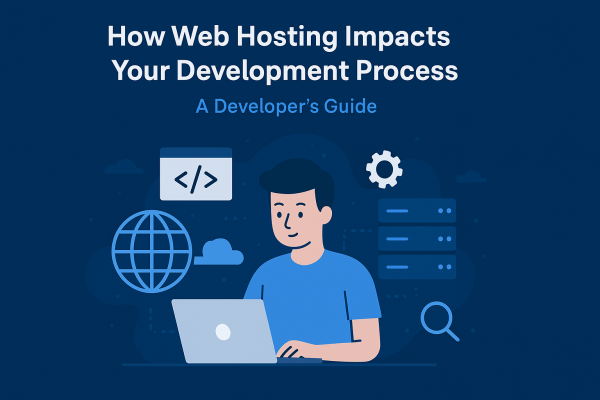Developers are concerned with web application building blocks like frameworks, languages, and design when developing web applications. But there is one factor that silently decides your productivity: web hosting. The type of hosting you choose does not just impact site performance—it actually impacts your development process, from deployment and debugging to collaboration and scalability.
In this developer's guide, we are going to explore the details of how web hosting impacts your workflow and what to expect from a provider.
Why Web Hosting Matters to Developers:
Web hosting is the foundation of your project's life cycle on the web. A poor hosting choice leads to:
Unreliable environments from local to production.
● Slow deployments and debugger-induced anguish.
● Security vulnerabilities and downtime.
But developer-friendly hosting allows you to:
Deploy effortlessly with Git and CI/CD pipelines.
● Collaborate smoothly with your team.
● Scale projects without any limitations on servers.
1. Environment Consistency vs. Hosting Servers One of the significant challenges that developers usually struggle with is the "works on my machine" problem.
Local Setup: Run code in Docker, WAMP, or Valet.
The server is running an
For example, you have built your application with PHP 8.2 and your host is ONLY supporting PHP version 7.4
Your code is broken.
The result is delays and debug time.
Solution: Hosting that allows multiple runtimes and staging environments, in addition to being container-based.
2. Manual vs. Automated Your method to deploy updates to production impacts your workflow.
● Manual Deployment: When you are uploading files via FTP, which is slow and fraught with mistakes.
● Automated Deployment: Git integration + build RTG scripts + zero-downtime deploys.
Consider it this way, for example: you are using GitHub action + a Git compatible host, which means when you commit to main, there are automated deployments, builds, and testing.
● Benefit: You can deploy faster with fewer bugs.
3. CI/CD Integration for Developers: In our workflows, CI/CD (Continuous Integration/Continuous Deployment) is a must today.
● Without CI/CD: Your projects are at risk of bugs because without manual testing nothing is verified before production.
● With CI/CD: Then it might look like the following: Automatic deployment, locking and testing are also the eventuality the consequence of every push.
● Tip: Look for hosting that is CI/CD compatible (is compatible with Jenkins, GitLab CI, Actions, CircleCI)
4. Developer Productivity and Server Performance: Server performance is not just end-user speed—it affects developers too. Every refresh while debugging = 10–15 seconds wasted.
● Fast Hosting: SSDs, caching, and databases optimized save hours. Effect: Faster iteration, easier debugging, better productivity.
5. Team Workflows and Collaboration: There are usually multiple developers on a project. Hosting makes a big difference to team productivity.
● Shared FTP Passwords: error-provoking and risky.
● Team Access Controls: Role-based access (e.g., juniors → staging, seniors → production).
● Staging Environments: do not overwrite live code. Example: Multi-user teams and team dashboards are supported by Vercel, DigitalOcean, and AWS hostings.
6. Security and Developer Peace of Mind: Security is the thing that makes developers slowest out of almost anything.
● Insecure Hosting: Hacks and malware repair hours lost.
● Secure Hosting: Auto SSL, firewalls, backups, and updates.
Developers code, not fight servers.
7. Scalability and Future-Proofing:
With increasing projects, hostings change.
● Shared Hosting: Cheap but limiting.
● VPS/Cloud Hosting: Scalable, flexible, and tweakable.
● Serverless Hosting: Automatic scaling for dynamic workloads.
Example: Black Friday is here, and your e-commerce site hosted on shared hosting crashes. A cloud host with scalability automatically scales resources to handle traffic.
8. Debugging and Monitoring Tools:
Debugging tools save hours of trial and error. Good Hosting: Error logs, server stats, and APM integrations available. Bad Hosting: Access restricted → late diagnosis.
Tip: Use hosts that offer real-time monitoring and error reporting (e.g., New Relic, Datadog).
9. Cost vs. Workflow Efficiency:
It is simple to pick the most economical host—but developers need to value time saved over dollars saved.
$3/month Shared Hosting: More debugging time spent on compatibility issues.
$20/month Developer Hosting: Git, CI/CD, staging → saves weeks of effort.
Rule of Thumb: Hosting is part of your toolkit, not just infrastructure.
10. Hosting Types and Workflows
Shared Hosting
Simple to launch however
Feature-limited. Legacy software.
Best Suited For: Simple sites, absolute beginner.
VPS Hosting
More control and resources however.
Requires technical server management.
Best Suited For: Developers who want greater flexibility.
Cloud Hosting
Scalable, APIs-first, and reliable however.
Complex for beginners.
Best Suited For: Start ups and growth apps.
Managed Hosting
Provider manages software updates, security, and backups however.
Expensive and limiting on control.
Best Suited For: Teams that want to focus coding only.
Serverless Hosting
Auto-scaling, pay-as-you-go however.
Cold start latency and vendor lock-in.
Best Suited For: Microservices, serverless applications, asynchronous event-based applications.
11. Tools and Platforms
● Vercel / Netlify → Great for JAMstack and frontend engineers.
● Heroku → Great for extreme speed.
● AWS / GCP / Azure → Enterprise level and flexible applications that are scalable.
● DigitalOcean / Linode → Easy-to-use cloud service and developer-friendly.
● Traditional cPanel hosts → Easy for beginner developers however limiting.
Conclusions: Web hosting is not just a place to shove your files, it's baked into your development workflow. Having the right hosting allows you to have: Local and production parity.
Automated deployments using git and CI/CD.
Logs and monitoring for troubleshooting.
Secure, elastic infrastructure.
Collaboration for teams.
As a developer, always ask: "Does this hosting fit into my workflow, or do I have to fit into theirs?"
● The answer will tell you if your development experience will be pain-free or not.

